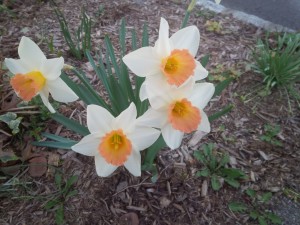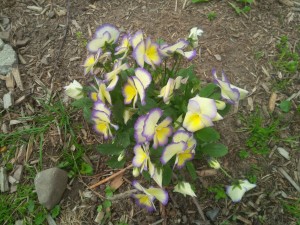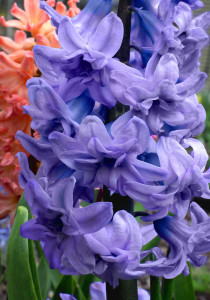
Coronavirus has turned the world upside down. This is not the first time that the world has turned upside down, but it is the first time in just over a century that a contagious disease has threatened so many people. Gardening might seem frivolous in the context of a global pandemic, but in reality it is just the opposite. People have cultivated plants through wars, economic upheaval and other epidemics, like the Spanish flu pandemic of 1918, when one third of the world population was infected with the Spanish flu virus.
We planted Victory Gardens during both World Wars, even as we sent our sons—and sometimes daughters– to war, endured scarcities of basic foods and consumer goods and worried about the implications of an enemy victory. During World War I, with the prospect of death ever present, English soldiers planted small gardens behind the trenches with seeds sent from home.
I imagine that in 1918 those who were not sick with the Spanish flu and those lucky enough to recover also tended both vegetable and ornamental plants. Dealing with the life of the garden is one of the best ways to mitigate worry about death and disease, and even to cope with grief. At the moment, when we are all worried about social distancing, we can get up close and personal with our plants, whether they grow outdoors, hold forth from indoor containers, ornament window boxes, or liven up terraces.
As the news about coronavirus has worsened, I have felt an overwhelming urge to buy as many flats of pansies as I can afford and position them all around my garden. Their “faces” will cheer me, along with everyone else who sees my garden as they walk their dogs or drive by.

Gardening is simultaneously an act of self care and an act of defiance in the face of crisis. A pot or a plot of daffodils is one of the best ways of shining a little light in a dark world.
So, since many of us are telecommuting, self-isolating, or simply waiting out the crisis, what can we do? For those with traditional gardens, garden clean-up is easy, gratifying and necessary. It doesn’t involve getting into groups of 250 or more–unless you count the birds, squirrels and insects–and provides some healthy exercise plus exposure to daylight.
If you like growing things from seed, plant sunflowers, tomatoes, herbs and ornamentals. If you don’t already have planting trays, seed packets, potting mix and other necessary equipment, order them online, or go to your local garden retailer during off-peak hours and pick up the supplies. You can achieve immediate gratification by buying many flats of pansies at the same time. Right now your newly-planted seedlings can get started indoors in a location with bright indirect light. By the time they are up and out of the soil, you will probably be able to put them in a shaded location outside where they can continue their journey to maturity until such time as you can transplant them into beds, borders and window boxes.
If you are not into seed starting, and more-than-minimal human contact is not high on your list of priorities, order plants by mail or online. Vendors have enormous selections right now and they will be delivered at the right time for planting in your specific USDA hardiness zone. At times like this, brightly colored annuals and perennials are a must. I feel the need for things like zinnias, sunflowers and snapdragons in multi-color mixes. I am re-evaluating gaudy daylilies and dahlias that I might previously have avoided lest I be arrested for felony bad taste. Yesterday I almost ordered an absolutely rococo-looking canna just because it made me feel happy.
And we all need to feel happy—at least sometimes–if we are going to weather this crisis. Take all the precautions necessary to keep yourself, your family and society as a whole as safe as possible. Then, if you are not ailing and you have done all the work of coronavirus prevention, look to plants and gardens.
Consider the magnolia, which has been on Earth at least 100 million years. The genus has endured through an awful lot of history—good and bad–and yet all around us modern magnolias are about to burst into bloom as if they had not a care in the world. Now, as in the past, our plants will see us through.

